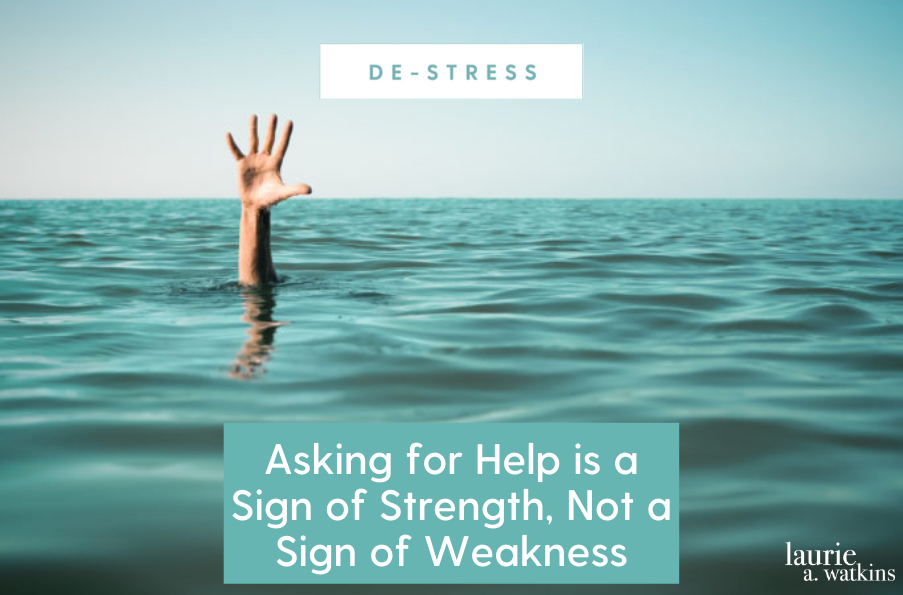We rarely expect anyone else to have all the answers or to be able to do it all. So why do we put that level of pressure on ourselves? How come it is so hard to ask for help?
I’ve written recently about how to Prevent Burnout with Strong Self Care. I think one of the best ways to avoid burnout is to ask for help. Asking for help is a sign of strength, not a sign of weakness.
We all need help sometimes. Financial, spiritual, emotional, and physical help are all aspects we may need to simply get through life. There is so much that we rely on others for without even asking: we get our mail delivered, our trash picked up, someone grows our food and cleans our water, etc. Therefore, it shouldn’t be seen as weak to ask for help when we already accept help daily without even asking.
Asking for help can cause feelings of uneasiness because we are essentially relinquishing some control to someone else. Many people also perceive asking for help as neediness or displaying inability.
There are instances when people ask for help that seem to be taking advantage of another person, or they are simply asking out of laziness. This isn’t what I am talking about. Sometimes we just NEED help. We can ask in a way that is more of assistance: we can take on some things around the house but not everything, we can do parts of a project at work but not the whole thing…
But as long as you’re respecting the other person, and you don’t feel entitled to their assistance but are instead grateful for it, and are understanding if they can’t or won’t help, then asking for help is absolutely part of going from stressed to strong! No one can do everything themselves, and even if they can, that doesn’t mean they should.
We need to normalize that saying, “I’m too busy” doesn’t necessarily mean “Every second of my day is booked” but rather, “I do not have the mental space to take this on right now.” Getting turned down for help is OK, not everyone has the bandwidth all the time. But that doesn’t mean that asking is wrong or weak or failure.
Author Brené Brown once wrote that, “vulnerability is courage in you and inadequacy in me.” This quote demonstrates how we believe that others see our vulnerability as a sign of weakness, but the truth is almost the exact opposite. Others think of our vulnerability as a sign of courage.
We should look at seeking help as having insight into knowing how to achieve our goals. It is also helpful to make giving help seem rewarding. Being sure the person you are asking for help from feels connected to what you need help with may be important.
Normally, when we ask someone else for help, we feel compelled to tell them about what we need help with, or what is going on in our lives as to why we can’t complete everything on our own. Therefore, asking for help can be a really great way to build and strengthen relationships at work or home. Sharing information about ourselves makes us seem more real, more trusting, and friendlier. Asking for help enables us to surround ourselves with people who make us feel good. We could all use some hope and optimism, especially when we need help. If we are able to surround ourselves with people who lift us up, it will ease the perceived burden of asking for help.
Some tips I have for asking for help to make it more comfortable of an experience for you include:
This may seem obvious, but you have to ask. People are busy and sometimes get really wrapped up in their own lives. No one is a mind reader and may not just recognize your need or want for help. It’s like asking for a raise. No one is going to just give it to you. People are rarely just waiting around to help you. You need to ask for what you deserve – and you are deserving of help when you need it.
Be specific. It really drives me nuts when people reach out and simply say they “want to connect” or “pick my brain.” I like when people are more direct with exactly what they need or want. It allows me to truly see if I have the capability or time or passion to help with certain projects. This is also true for people you live with. There’s a big difference between, “I’d like things kept cleaner around here” and “Can we be sure the dishes get done every night?”
Start off with really close friends, your partner, roommate, or family. Ask them for help with something you are almost certain they can help with. Starting off small with asking for help can help you get more comfortable with the process of letting go of some control enough that you can ask for help more easily in bigger situations.
Set a trend. Just because you don’t see other people asking for help at home or at work, doesn’t mean they don’t want it. Set the precedent and make it clear that you are able to ask for help and available to help others. It just may encourage a shift in culture and/or dynamic.
Don’t delay. Asking for help when you are at the end of your rope and about to snap is likely too late. The longer you wait, the more your problems can multiply. If you are stressed when asking for help, others will pick up on it and be warier to step in.
Asking for help is a combination of delegating and self-advocating, and it can be very empowering! I wrote a whole book on being a high achiever and managing stress. I promise, you can still be seen as a high achiever even if you ask for help.
We need to shift our mindsets to how much strength it takes to delegate and get assistance and no longer view it as weakness. Asking isn’t taking, it is giving – giving someone else the opportunity to be strengthened and empowered by helping.
I would love to hear from you on this topic. How do you feel about asking for help? Does it make you feel empowered or vulnerable? How do you feel about helping others? Does it make you happy or do you see it as a burden?
I’d also love for you to share some instances when you got help and how it made an impact on your life. Please feel free to comment below or on my social media pages.






